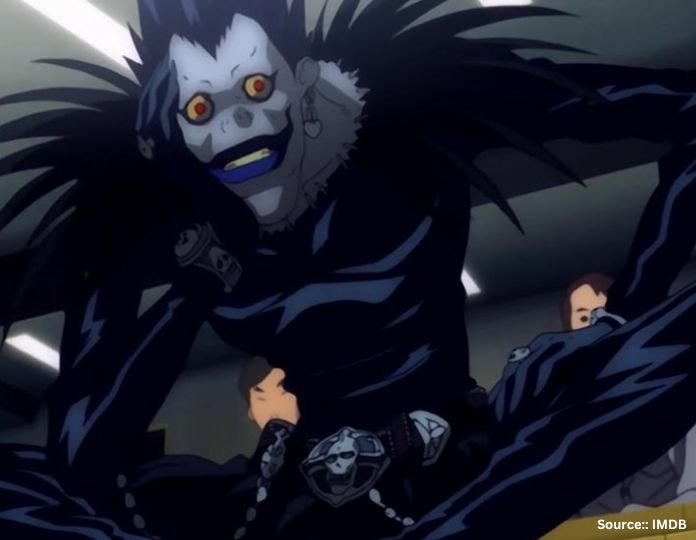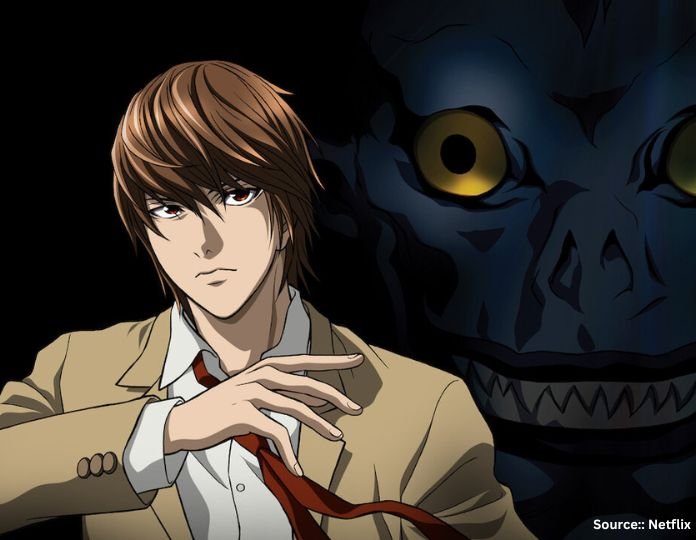Light Yagami is a high school student reputed for excelling in both his academic and sports domains. He is also famous among the girls for his looks. To an outside viewer, he is the perfect student. He has all the areas covered.
One fine afternoon, he sees a notebook falling from the sky. It drops beside the school ground and light picks it up after his classes are over. On the very first page, it mentioned that the owner of this notebook can kill a person if he/she is aware of their name and how they look. One simply needs to write down the name on the notebook while picturing the face of the victim and within a few minutes, that person will have died.
At first, it seems like a prank to him. As the series progresses, Light finds out that this notebook is no joke. It is very much capable of taking the life of anyone he wants. He starts his murder spree by killing criminals who were shown on television. As the cases start to pile up, the police take the help of a famous detective known as L Lawliet. He stood at the opposing end of the spectrum when it came to perceiving justice, making him a suitable candidate to stand against the protagonist.
The series plays out like a chess match between Light and L with L being blindfolded because of how deceptive and powerful the notebook was. Light always had an advantage from the beginning but his egocentric thinking got the better of him time and again.
God Complex
Whenever a person is bestowed with a lot of power, he or she is likely to develop a god complex where they consider themselves something more than just a human. We have seen several examples throughout history which include Alexander the Great, Napolean, Adolf Hitler, Pharaoh Ramses II and several others. Light Yagami was no exception. The ability to murder someone using a pen and a notebook is a great power indeed. The notebook also makes it very difficult to catch him since he doesn’t even have to go anywhere to kill. He can commit mass murders from his desk itself.

Light’s god complex was seen in an episode where he was given the choice to get the ‘Shinigami Eyes’. These would have allowed him to look at a person’s face and see their name flashing above. It would have been easy to murder L (the detective who was after him) had he accepted the offer because he had seen him but his name was unknown. There was one catch though.
The eyes would have taken away half of his lifespan. Light refused it by saying, “I cannot die. My existence is necessary for justice.” He valued his existence very much because, in his mind, the world needed him. He saw himself as a god or as the series calls him, Kira (derived from the Japanese pronunciation of the word “killer).
“This world is rotten, and those who are making it rot deserve to die. Someone has to do it, so why not me?” Even though there isn’t anything inherently wrong with this statement, it led Light to believe that he has the absolute right to bring justice to this world.
Utilitarianism vs. Deontology
Utilitarianism judges actions and behaviours on the basis of the consequences that they produce. It aligns with Light’s perspective as he believes that eliminating a few bad people will be a good thing for the majority. He wanted to create a utopia free of crime and he was willing to take up any means to get there. To him, the end justifies the means.
Deontology on the other hand says that actions are inherently wrong or right, no matter the outcome. It labels killing as intrinsically wrong while ignoring the justification provided for it. Detective L follows this as according to him, the idea of justice itself is corrupted when murder is used as a means of achieving it. The two philosophies clash time and again throughout the series. It raises ethical dilemmas like, “Can murder really be used as a tool for justice?” and “Are our morals and principles absolute or relative?”
Kohlberg’s Stages of Moral Development and Light Yagami
1. Pre-Conventional Level (Self-Interest)
When Light had the notebook for the very first time, he thought of it as a tool to make the world a better place for himself and the people he cares about by eliminating criminals. These motivations were mostly self-centred with a hint of power acquisition and a superiority complex. At this stage, he was focused only on killing the ‘rotten’ part of society.

2. Conventional Level (Social Order)
As Light starts to gain more power, he starts thinking that by enforcing a new social order, crime will be prevented by the fear of punishment or death. Light adopts a distorted sense of duty, perceiving himself as a supreme authority and defending his murders by saying that they are necessary for preserving the peace.
3. Post-Conventional Level (Principles)
Towards the end, Light is convinced that the legal system in this world is flawed and that he is the only one who can change it. He sacrifices innocent lives in order to save himself because his survival is essential to creating this new world that he had envisioned. He abandons his initial motivations of ‘doing the right thing’ and runs havoc among society. His morality decays as the series goes on. His sense of judgment was skewed because the notebook was giving him more power than he could handle. L Lawliet was getting closer and closer to catching him and this anxiety and fear of being caught led him to murder anyone who got in the way.
Conclusion
The scary thing is that most of us would become like Light Yagami if the death note fell out of the sky and appeared on our doorstep. All of us are somehow corrupted by our sense of justice. It is understandable because of the injustice that we have faced in our lives ourselves. We want to make things better by taking control in our own hands.
However, when a single person is given the amount of power that the protagonist had over here, he/she is very likely to become the very thing they swore to destroy. Light may have wanted to eliminate criminals from the world but in the process, he became one himself. That’s the irony of this world. When given authority, we become a part of the system that we want to change. It’s no surprise that people around the world are unhappy with people who have power over them. It is not because they despise it but because they desire that ugly power as well.
References +
Segal, G. (2022, October 6). Death note: Is the serial killer Light Yagami a psychopath? CBR. https://www.cbr.com/death-note-light-yagami-psychopath-serial-killer/
Andy. (2024, January 30). Death Note: A Psychological Analysis. Andy Psychology. https://andypsychology.com/death-note-a-psychological-analysis/
Jobookloveblog, V. a. P. B. (2020, December 9). Psychological analysis of Light Yagami (Death note). WordPress.com. https://jobookloveblog.wordpress.com/2018/07/22/psychological-analysis-of-light-yagami-death-note/













Leave feedback about this